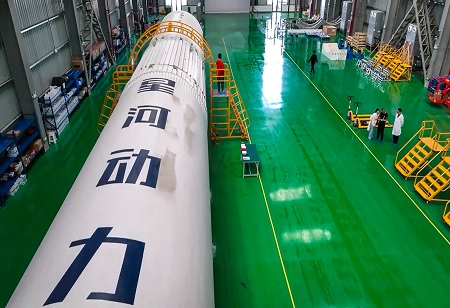
China's Space Pioneer Secures $207 Million for Reusable Rocket Development

 Beijing-based rocket developer Space Pioneer, also known as Beijing Tianbing Technology Co, has raised over 1.5 billion yuan ($207 million) in a recent fundraising round to support the development of its reusable rockets. Since its founding in 2019, the company has accumulated more than 4 billion yuan across 15 financing rounds. This latest funding, sourced from private equity and state-backed venture capital firms, will be used to finance the first flight and mass production of the Tianlong-3 rocket.
Beijing-based rocket developer Space Pioneer, also known as Beijing Tianbing Technology Co, has raised over 1.5 billion yuan ($207 million) in a recent fundraising round to support the development of its reusable rockets. Since its founding in 2019, the company has accumulated more than 4 billion yuan across 15 financing rounds. This latest funding, sourced from private equity and state-backed venture capital firms, will be used to finance the first flight and mass production of the Tianlong-3 rocket.
Space Pioneer is one of several rapidly growing private-sector rocket developers in China, encouraged by the government’s aim to establish the nation as a major space power. In April 2023, Space Pioneer successfully launched the Tianlong-2 (Sky Dragon), becoming the first private Chinese firm to send a liquid-propellant rocket into space.
The Tianlong-3, a two-stage rocket with a reusable first stage, aims to significantly reduce mission costs for clients. The company plans to eventually launch a larger variant of the Tianlong-3, comparable to SpaceX's Falcon 9. The strategic objective of the Tianlong-3 is to bolster China's satellite constellation by deploying up to 30 satellites permission at a reduced cost.
China is increasingly concerned about the dominance of SpaceX's Starlink satellites in low Earth orbit (LEO) and its implications in a potential military conflict with the United States. Currently, China operates a few hundred satellites in LEO, while Starlink has several thousand. To address this gap, Chinese state-owned enterprises and private rocket developers plan to launch thousands of LEO satellites over the next decade.
Space Pioneer emphasizes that the rise of commercial liquid-propellant rockets in China is essential for constructing large low-orbit satellite constellations. The development and mass production of the Tianlong-3 rocket will enhance China's competitiveness and expedite the creation of its satellite Internet constellation.

